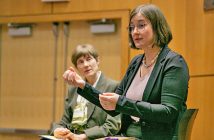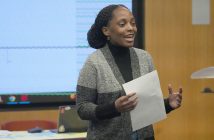
Terry Eagleton, author of Reason, Faith, and Revolution: Reflections on the God Debate, pits faith against doubt during the Center on Religion and Culture’s Oct. 15 presentation, “Uneasy Grace.” Photo by Leo Sorel
Some of the world’s most devout believers have something in common: from time to time, they were plagued by doubt.
On Oct. 15, Fordham’s Center on Religion and Cultureexamined the relationship between faith and doubt in a lecture and panel discussion, “Uneasy Grace: Can Faith and Doubt Co-Exist?”
The event featured Terry Eagleton, author of Reason, Faith, and Revolution: Reflections on the God Debate(Yale University Press, 2010) and On Evil (Yale University Press, 2011).
One way to understand how faith works, Eagleton said, is through Bigfoot: The evidence as to whether Bigfoot exists is ambiguous; as a result, some people believe he exists while others don’t.
“Substitute ‘God’ for ‘Bigfoot’ here and you have a version of what faith consists in,” Eagleton said. Some have religious faith, and some don’t.
When it comes to religion, however, few would be willing to chalk up their core beliefs to arbitrariness. For believers, faith is a matter of certainty, Eagleton said, not unlike the way that a person can be certain that he or she is in love.
“Faith isn’t exactly something we decide,” Eagleton said. “But that’s not to say that faith doesn’t engage the conscious mind. Faith must be rational in the sense that one must be able to advance reasons for it.”
And although faith is a matter of “passionate conviction,” this does not put faith at odds with doubt. Doubt, he said, is essential to the very definition of faith.
“Doubt only exists in a context of certainty,” he said. “Doubt isn’t some sinful lapse from unwavering faith—it’s actually built into it. A proposition you couldn’t doubt wouldn’t be a matter of faith.”
In the same way that faith and reason are not incompatible, doubt is not a threat to faith.
“You can be certain that you love someone… while succumbing to the occasional doubt,” he said.
Ultimately, when it comes to faith, certainty is less of a problem than the ways in which we act from our faith, Eagleton said. Too much of either faith or doubt can tip someone toward dogmatism and radicalism, which inevitably divide people and societies. It is important to balance certainty and open-mindedness, Eagleton said—to allow faith and doubt to coexist.
“The world is divided between those who believe too little and those who believe too much,” he said. “The fundamentalists forget that certainty can kill, while the middle-class liberals forget that it can liberate.”
Other panelists included:
- Moderator Elizabeth Johnson, C.S.J., Ph.D., Distinguished Professor of Theology at Fordham;
- Meghan Sullivan, Ph.D., the Rev. John A. O’Brien Assistant Professor of Philosophy at Notre Dame; and
- Lamin Sanneh, Ph.D., the D. Willis James Professor of Missions and World Christianity at Yale University.
Sullivan said that the times at which faith seems to clash most with reason is when it comes to the specific beliefs of a given religious tradition. When she converted to Catholicism, she said that she initially concealed her faith because she wasn’t sure whether she could provide a rational argument for her beliefs—especially those which science, history, or logic might be able to contradict outright.
However, this doesn’t mean that the two are irreconcilable, she said.
“Reason is the faculty by which we develop faith,” Sullivan said. “The way I see it, religious faith, like other parts of our cognitive lives, is always looking for reasons and questioning whether those reasons are good or bad.”
Even when those reasons inspire doubt, faith shouldn’t be automatically abandoned. She pointed out that two of our best theories of the universe, quantum mechanics and general relativity, are at odds with one another, yet scientists aren’t about to jettison one or the other. This simply means that the quest for understanding must continue.
“Human beings cannot live alone, nor by self alone,” Sanneh added. “Religion calls for a deeper reckoning of the meaning and purpose of human life. Agnosticism is unfulfilling as a stopgap.
“What matters is to search—the quest, not the goal or destination.”

(From left) Meghan Sullivan, Terry Eagleton, Lamin Sanneh, and Sister Elizabeth Johnson at “Uneasy Grace” Photo by Leo Sorel


